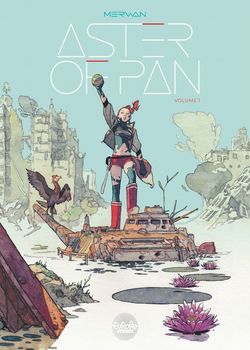Aster of Pan — Volume 1

- Art: Merwan
- Translation Publisher: Europe Comics
- Original Publisher: Dargaud
- BDtheque link
- Genre: Apocalypse
Banned from a pseudo society in a world mired in its apocalypse, Aster can only count on his comrade Wallis, as transfixed with affection as he is ignored by everyone. While their clan finds itself under the threat of a terrifying power and the demons of the past resurface, the wild woman will reveal herself, thwart the safeguards of a corrupt feudal society, lighting the first fuse of a freedom movement.
Based on a “David against Goliath” type story, Merwan offers a very classic adventure, full of imposed figures, pleasant, if not striking. From the first pages, the fact that the author is above all a graphic designer is obvious, and the promise of being entitled to a sort of portfolio of the extent of his talent is probable. In a globalist style, evoking as much the European school as Otomo, even Frank Miller, it shines in its strong points, the very origin of its possible weaknesses: the colors are absolutely magnificent, airy, offering a truly personal palette, without forgetting to be efficient. Without falling into watercolor drawing, he manages to retain these qualities of transparency which make the discipline specific. And there a few problems arise when he takes up the pen to establish the outlines, a process which he could perhaps have done without. When it comes to drawing fine lines, the process remains discreet and effective, but as soon as the brush is picked up to paint more substantial blacks, the subtlety loses, the contradiction of the techniques becoming almost glaring.
Beyond these stylistic considerations, we must recognize that the ambition of the project is essentially narrative: in a form of absolute decompression, there is room for long action sequences choreographed to the extreme, almost cinematographic, certainly iconic, but paradoxically not very dynamic. , because everything seems suspended, frozen. The whole thing remains impressive - the build-up to a game of post-apocalyptic dodgeball in three acts is quite enjoyable -, while revealing the limits of an author who, although ambitious, still shows a good margin progress for the future.
Sometimes, the impression is felt of reading the production bible of an animation project, pleasant, although without real surprises, offering a very conventional discourse on the excesses of authority, from the family level to that of the state. Not to mention the dialogues which remain quite basic, even obsolete ("stupid"?!). Furthermore, what is the real translation of a context "Fontainebleau, 2068" (100 years after May 68?)? Only a few pages at the beginning mention it. Quickly, the action could take place in Japan as well as in Russia, this fact not really being embodied in the story.
Fortunately, while the enterprise continues without displeasure, but without passion, the reader finds himself truly taken by the stakes in the second round of the game which articulates the adventure, an epic breath suddenly igniting a story that had hitherto been humming along. Between over-cut action and vaguely funny jokes, a real emotion sets in, that of fervor for the underdog, one of the great successes of a youth album which poses more as a promise of the future than as a work of maturity, and that’s already not bad!
